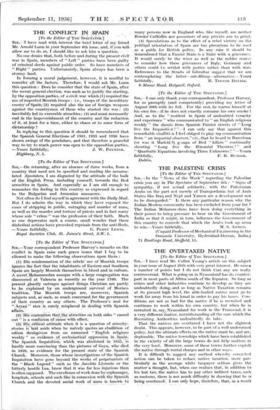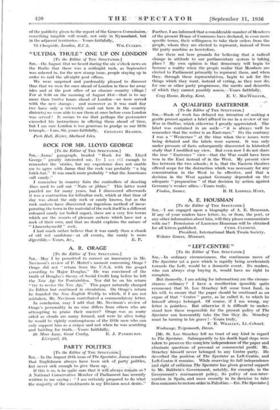THE OVERTAXED NATIVE
[To the Editor of THE SPECTATOR.]
have read Mr. Cullen Young's article on this subject in your issue of August 28th with very great interest. He raises a number of points but I do not think that any are really controversial. What is going on in Nyassaland ha.4 its counter- part in most parts of Africa south of the Equator. So long as mines and other industries continue to develop as they are undoubtedly doing, and so long as Native Taxation remains at its present high level, the able-bodied native must go to work far away from his kraal in order to pay his taxes. Con- ditions are not so bad for the native if he is recruited and continues to work within his own country, but when he is recruited in, sak Nyassaland for work in the Transvaal, it is a very different matter, notwithstanding all the care which the Recruiting Authorities undoubtedly do take.
That the natives are overtaked I have not the slightest doubt. This appears, however, to be part of a well understood' policy, but the ultimate effects on the native must be, and are, deplorable. The native townships whielihriVe been established in' the vicinity of all the large towns' do sat .11kp mailers in the very least:"Moreover, some of these towns further exploit the native through 'rental charges and in other ways.
It is difficult to "suggest any method miscreby concerted action dirt be taken to reduce native taxation, more par- tie-tilisfly as the' average white taxpayer seldom gives the matter a thought, but,'when one realises that, In addition to his• hut trix,-the native has to pay other indirect taxes; such as customs, there is 'not much difficulty in showing that he is being overtaxed:' I can -Only hopt, therefore, that,' as a result of the publicity given to the report of the Geneva-Commission,: something tangible will result, not only• in Nyassaland, but
in the adjacent territories.—Yours , - .
73 Cheapside, London, E.C.2. CULLEN.













































 Previous page
Previous page